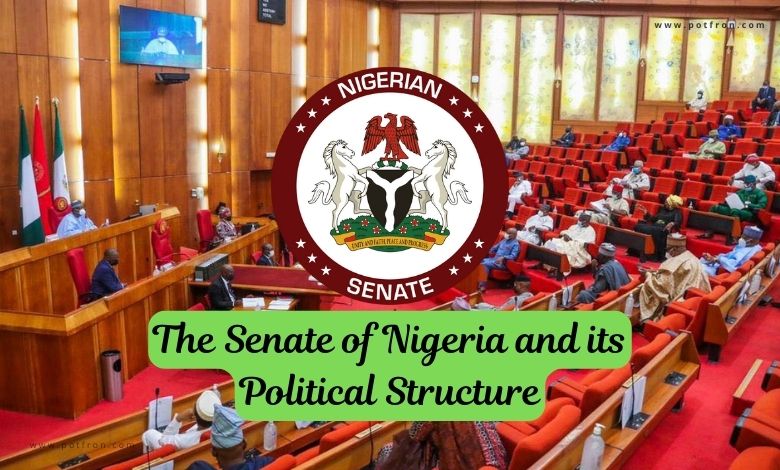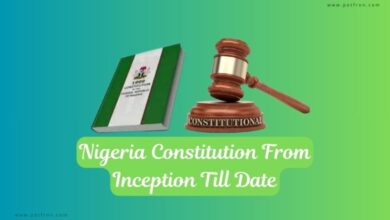
The Senate of Nigeria or the Nigerian senate is one of the two chambers of the National Assembly, and is Nigeria’s highest legislative body. It is responsible for shaping policies, making laws, and providing oversight for the executive arm of government.
It was created in 1979 as part of the Second Republic under the 1979 Constitution, which established a bicameral legislature. However, Nigeria had earlier legislative bodies dating back to 1960, but they were unicameral or part of different governmental structures.
The current Senate, as part of the National Assembly, was re-established in 1999 with the return to democracy under the Fourth Republic.
Nigeria operates a bicameral legislature, meaning it has two chambers: the Senate and the House of Representatives.
The Senate is the upper chamber, and its structure, functions, and political dynamics significantly impact governance and the country’s democratic processes.
Related: Nigeria Constitution From Inception Till Date
| List | Details |
|---|---|
| Senate Created | 1979 (re-established in 1999) |
| Political Type | Bicameral Legislature |
| Political Power Structure | Presidential System |
| Number of Senators | 109 |
| Voting System | First-Past-the-Post system |
| Next Senate Election Date | 27 February 2027 |
| Term Length | 4 years |
| Location | Abuja, FCT, Nigeria |

Structure of the Nigerian Senate
The Senate of Nigeria consists of 109 Senators elected from the 36 states and the Federal Capital Territory (FCT). Each state elects three Senators, while the FCT elects one, ensuring equal representation regardless of the population size of a state.
Nigeria Senate Leadership Structure
The Senate is governed by a structured hierarchy, ensuring smooth legislative functions. The key leadership positions include:
- Senate President: The presiding officer of the Senate is elected from among the members. The Senate President oversees proceedings, represents the Senate at official functions, and plays a critical role in legislative decision-making.
- Deputy Senate President: Assists the Senate President and acts in his absence.
- Majority Leader: Represents the party with the most seats in the Senate and plays a key role in legislative agenda-setting.
- Minority Leader: Represents the opposition and ensures that alternative views are represented in legislative discussions.
- Whips: Responsible for party discipline, ensuring members vote according to their party’s stance.
- Committee Chairpersons: Lead various committees that oversee specific sectors, such as finance, defense, and judiciary.
Recommended: Cabinet of Nigeria And its Presidential System
Current Nigeria Senate Members
The 10th National Assembly Leadership of the Federal Republic of Nigeria are:
| Positions | Name | Political Party | Assumed Office Since |
|---|---|---|---|
| Senate President | Godswill Akpabio | APC | 13 June 2023 |
| Deputy Senate President | Barau Jibrin | APC | 13 June 2023 |
| Senate Majority Leader | Michael Opeyemi Bamidele | APC | 4 July 2023 |
| Senate Minority Leader | Patrick Abba Moro | PDP | 21 Nov 2023 |
| Majority Whip | Mohammed Tahir Monguno | APC | 17 July 2024 |
| Minority Whip | Osita Ngwu | PDP | 21 Nov 2023 |
Related: Nigeria Coat of Arms And its Full Meaning
Related: Nigeria National Anthem and Its Frequently Asked Questions
Senatorial Committees
The Senate operates through a system of committees, which handle legislative scrutiny, policy analysis, and oversight functions. Some key committees include:
- Public Accounts Committee – Oversees government expenditures.
- Judiciary Committee – Deals with judicial matters and appointments.
- Defense Committee – Focuses on security and military issues.
- Appropriations Committee – Responsible for national budget approvals.
- Foreign Affairs Committee – Handles international relations and diplomacy.
Recommended: How Nigeria’s 36 States and Capitals Came to Be
Functions of the Nigerian Senate
The Senate performs several critical functions that uphold democracy and governance in Nigeria:
- Legislation:
- The Senate is responsible for making, amending, and repealing laws that govern the country. A bill must pass through multiple readings and committees before being approved and sent to the President for assent.
- Oversight and Checks on the Executive:
- The Senate exercises oversight over the executive branch by scrutinizing government activities, budgets, and policies to prevent abuse of power and corruption.
- Approval of Appointments:
- The President of Nigeria nominates ministers, ambassadors, and key government officials, but the Senate must approve these appointments.
- Budget and Appropriations:
- The Senate plays a significant role in approving the national budget, ensuring that funds are allocated appropriately for national development.
- Impeachment Powers:
- The Senate has the power to impeach the Nigeria President, Nigeria Vice President, and other top officials if they violate the Constitution of Nigeria or engage in gross misconduct.
Also read: An Overview of Nigeria Political System
Political System of the Senate
1. Bicameral Legislature:
Nigeria operates a bicameral legislature, meaning it has two chambers – the Senate (upper chamber) and the House of Representatives (lower chamber). The Senate provides a balance of power by ensuring that no single region or interest group dominates legislative processes.
2. Political Party System:
Nigeria has a multi-party system, but the Senate is typically dominated by the two largest political parties:
- All Progressives Congress (APC)
- People’s Democratic Party (PDP)
Senators are elected based on their party affiliations, and party loyalty significantly influences legislative decision-making.
3. Election Process:
Senators are elected every four years during general elections. The election follows the First-Past-the-Post system, where the candidate with the highest votes in a senatorial district wins.
4. Tenure and Term Limits:
Nigeria Senators serve a four-year term but can be re-elected indefinitely. Some senators have served multiple terms, making them influential figures in Nigerian politics.
Related: List of Nigeria Past Presidents
Also read: List of Nigeria Past Vice Presidents




